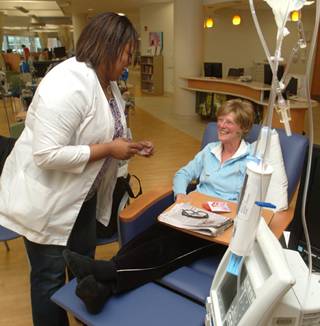As an academic medical center, the Georgia Cancer Center in Augusta, GA is actively involved in cancer research for cancer patients. Clinical trials evaluate new approaches aimed at improving various aspects of cancer care in a well-structured, carefully designed and monitored approach. Clinical trials offer new alternatives for the management of cancer therapy and frequently participation in a clinical trial offers the best outcome for patients.
Clinical trials for all types of malignancies are available and may include new cancer therapies or other approaches aimed at improving over the current standards when these are not optimal. Various types of clinical trials are available, from those investigating brand new cancer therapies that are just starting to be investigated, to the more advanced trials where the benefit of a therapy that has gone through various steps of research is being compared to the standard therapy to determine its possible benefit.
The Georgia Cancer Center houses a dedicated cancer clinical research unit that oversees the center’s own Phase I-IV trials and manages studies from all different disciplines such as medical oncology, hematology, gynecologic oncology, surgery, radiotherapy and others.
There are currently approximately 70 clinical trials open for accrual with others being developed.
CURRENTLY ENROLLED CANCER TRIALS
Clinical Trials Office
Health Sciences Campus
GCC - M. Bert Storey Research Building
1410 Laney Walker Boulevard, Augusta, GA 30912

National Cancer Institute
The National Cancer Institute provides basic information about clinical trials to help cancer patients understand what’s involved in taking part. This includes information about the benefits and risks, who is responsible for which research costs, and how your safety is protected.

American Cancer Society
In this section you can learn more from the American Cancer Society about clinical trials in general, find tools to help you decide if a clinical trial may be right for you, and search for specific studies you may be eligible to take part in.

Leukemia and Lymphoma Society
Taking part in a clinical trial may be the best treatment choice for some blood cancer patients. There are trials for patients at every stage of treatment as well as those in remission. Virtually all of today's standard treatments for cancer are based on previous clinical trials.
Treatment trials test new treatments, such as a new cancer drug, new approaches to surgery or radiation therapy, new combinations of treatments, or new methods such as gene therapy.
Prevention trials test new approaches, such as medicines, vitamins, minerals or other supplements that doctors believe may lower the risk of a certain type of cancer. These trials look for the best way to prevent cancer in people who have never had cancer or to prevent cancer from coming back or a new cancer from occurring in people who have already had cancer.
Screening trials test the best way to find cancer, especially in its early stages.